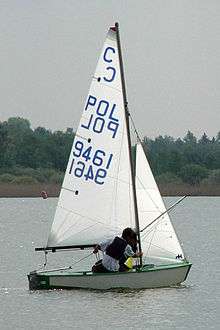Cadet (dinghy)
|
C Class symbol | |
|
A Cadet class dinghy POL 8457 | |
| Development | |
|---|---|
| Designer | Jack Holt |
| Year | 1947 |
| Design | One-Design |
| Role | Junior class |
| Boat | |
| Crew | 2 |
| Draft | 0.16 m (without centreboard) |
| Trapeze | none |
| Hull | |
| Type | Monohull |
| Construction | Plywood or foam sandwich |
| Hull weight | 54 kg (119 lbs) |
| LOA | 3.2 m (10 ft 6 in) |
| Beam | 1.38 m (4 ft 6 in) |
| Hull Appendages | |
| Keel/Board Type | Centerboard |
| Rig | |
| Rig Type | Bermuda |
| Mast Length | 5.22 m (17 ft) |
| Sails | |
| Mainsail area | 3.9 m2 |
| Jib / Genoa area | 1.26 m2 |
| Spinnaker area | 4.25 m2 |
| Misc | |
| RYA PN | 1432 |
The Cadet is a class of sailing dinghy designed to be sailed by two children at the age of 17. It is a one-design class, originally designed by Jack Holt in 1947. Cadets are sailed worldwide in at least 18 countries. [1]
History
In 1947, Yachting World organised a design competition for a beginners' sailing dinghy that the current Cadet-design won. [2]
Design
The boat is crewed by two people and sails with a bermuda rigged mainsail, jib and spinnaker. The Cadet is the only recognised two persons youth-boat by the International Sailing Federation (ISAF) as an International Competitive Youth Sailing Class since 1958. Over 10000 Cadets have been built worldwide by registered builders on three continents.
The Cadet is sailed internationally throughout Europe, Asia, Australia and South America. Originally made of wood, the majority of the international fleet is now constructed of fibreglass. The strongest fleets are currently situated in the Ukraine, Poland, the UK and Argentina. Argentine sailors won 14 world championships in the 20-year period between 1991 and 2010.
The Cadet is 3.2 metres long, 1.38 m wide, and weighs 54 kilograms.[3] With the centerboard up, the hull draft is 16 cm; the mast is deck-stepped and 5.22 m high, the mainsail area is 3.9 m2, the jib 1.26 m2 and the spinnaker 4.25 m2.[1] The side decks are designed so that a capsize normally does not fill the hull with water. In a mixed fleet, the Cadet has a Portsmouth Yardstick handicap of 1428, the second-slowest in the PY scheme.[4]
Events
The class most important competition is the Cadet World Championship.
See also
- International Cadet Australian Championship
- 50th Redlands International Cadet Australian Championship
References
- 1 2 "The Cadet". International Cadet Class. Retrieved 12 October 2012.
- ↑ Bremberg, Fred; Seth, Staffan (1965), Segelbåtstyper: kortfattade beskrivningar med igenkänningstecken och dimensionsuppgifter för svenska segelbåtar (in Swedish) (2nd revised ed.), Stockholm: Aldus/Bonnier, p. 37
- ↑ "Cadet". ISAF. Retrieved 12 October 2012.
- ↑ "Portsmouth Number List 2016" (PDF). Royal Yachting Association. Retrieved 6 June 2016.
External links
| Wikimedia Commons has media related to Cadet (dinghy). |
